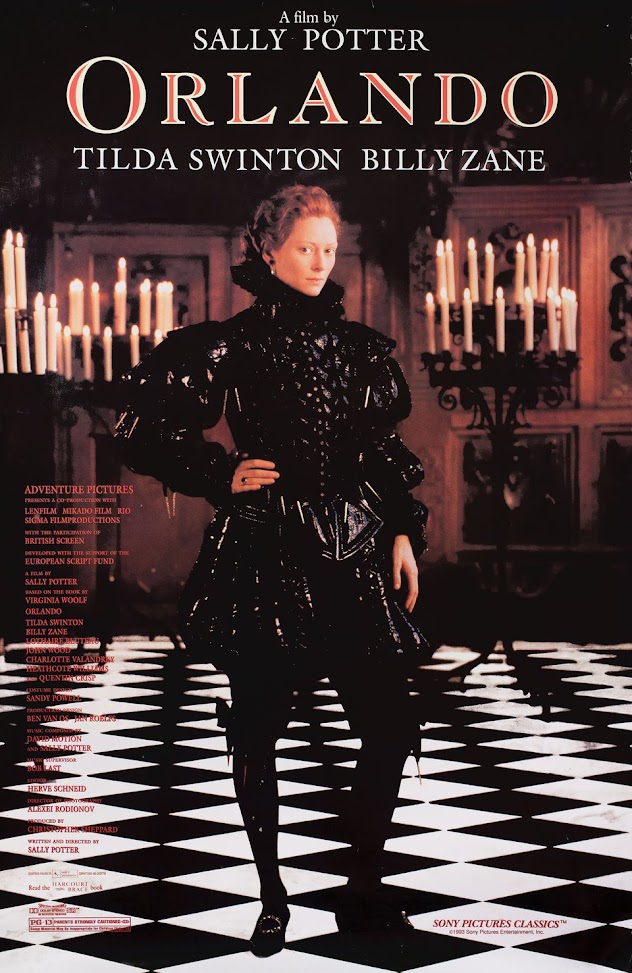ORLANDO (1992) ★ ★ ★ ★
It's safe to say that every movie lover should view "Orlando." The reason is simple: movies immortalize the people that are in them, and no movie deals with the subject of immortality better than this one.
There isn't really a serious story here. There is no logic animating the things we are shown. Instead, Sally Potter ("The Man Who Cried") directed a film about a young man who decides to live forever, and makes good on his decision. It's an interesting idea that raises the question, what if we could choose to not die? What if the inevitability of death were an illusion, and a conscious sidestep meant one could enjoy a biblical lifespan of many centuries, and without showing any wrinkles? The question is culled from Virginia Woolf's 1928 novel, Orlando: A Biography, but there are no bookish pretensions here. "Orlando" stars a naturally ageless Tilda Swinton as a young nobleman in seventeenth century England who is given the ultimate pep-talk by Queen Elizabeth I, and that pep is omnipresent -- this movie is alive.
The sovereign, who is cannily portrayed by Quentin Crisp, tells him on her deathbed in 1603 that she will bestow upon him a castle and its acreage, on the condition that he does not fade, does not wither, and does not grow old. Challenge accepted. From that point onward, Orlando sequesters himself in the castle and dawdles his way through two hundred years of self-invention and reinvention. He attempts to be an artist, and when that doesn't take he tries his hand at poetry, and fails yet again. I noticed that during this "masculine" stage of Orlando's life, through which he is shown as somewhat effeminate, cinematographer Aleksei Rodionov's unique soft-focus style quelled my doubts that a woman could play a man. The makeup, the lighting, and the shrewdly detached affect adopted by Swinton makes her believable in the role, though only barely. Her skill makes her passable, and I think the decision to be her character's own unreliable observer makes it stick. She carries herself with the carelessness of a young man, and I found myself mesmerized by her aloofness. I anticipated the moment in the story when she becomes a woman, and wanted to see if she would come across as significantly different after the flip.
The beauty of "Orlando" is that it sets the viewer up for this sort of anticipation on many fronts, and it delivers again and again. Just when I began to wonder if immortality had limits, a conceit teased at in the character's own everlasting boredom, I learned that a brush with death does extreme things to a person who refuses to die. In Orlando's case, it changed him to a her; the mirror shows not a rosy-cheeked youth, but a beautiful girl. But this transformation brings some inconvenient baggage, as the other unreliable observers in this story, i.e., the public, accuse her of having been a woman all along, and ownership of her estate is legally revoked. This leads the character down the dustier stretch of her endless years, as she endures the horrors of the twentieth century and finds herself weary of the world, and its many disappointments. Her story brings with it the lessons that eternity is a lonely place, and the shortcomings of mortals make it so.
This movie is probably not the best example of a great work of literature transcribed by cameras, but it is a great piece of camerawork. It is visually, texturally, luminously radiant. I feel that its earlier period scenes are among the best, on par with the works of Kubrick and Forman. Billy Zane's appearance as Shelmerdine, Orlando's late-life suitor, is commendable for being a rare case of the actor showing self-restraint, and his character's subtleties are the perfect complement to an ethereal lover.
I felt that I had been made a better person after seeing "Orlando," a sentiment I don't often have when the credits roll. I only regret that I won't live long enough to see another film quite like it.
--- Bill Fontaine



